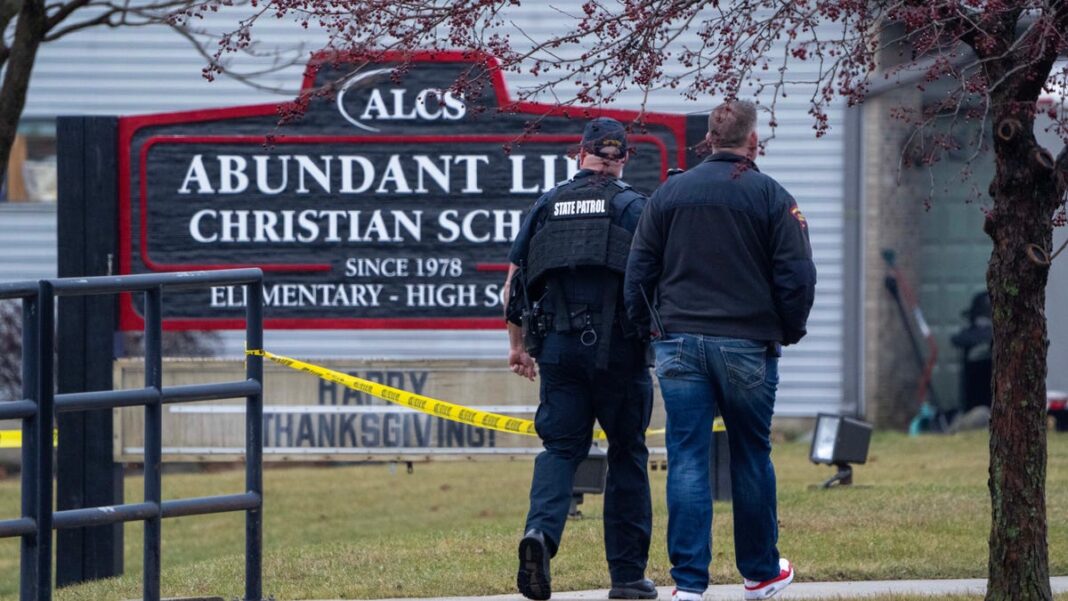Madison school shooting will soon be forgotten. Just like 82 others. | Opinion
The stark contrast in our responses to the deaths of a CEO and of schoolchildren in Wisconsin reveals an unsettling reality.
In a truly civilized society, every instance of gun violence would be significant. The loss of each life should deeply disturb us.
However, this is not the case in America. What appears to matter greatly seems to be who the victims are.
Currently, our focus is on a tragic shooting at a private Christian school in Madison, Wisconsin. Reports indicate that a 15-year-old student opened fire, resulting in three fatalities, including the shooter, and injuring six others.
This act is, without a doubt, horrific. It was equally horrific when UnitedHealthcare CEO Brian Thompson was killed in a shooting on December 4 in New York City.
Comparing a school shooting to a CEO’s murder and who is prioritized
It should not be controversial—though it often is—to assert that no one should be shot and killed in the United States.
No one should live in fear of gun violence, whether in a classroom, on city streets, in churches, theaters, or shopping centers.
Now, reflect on the public reaction to Thompson’s untimely death.
The media coverage was overwhelming and continues to be widespread. The shock and alarm within corporate circles were evident, prompting companies to quickly enhance security for their top executives.
New York Governor Kathy Hochul promptly gathered nearly 200 business leaders to, as reported by Politico, discuss “sharing security resources.”
New York’s extensive response to the death of the UnitedHealthcare CEO
Kathy Wylde, leader of the Partnership for New York City, remarked on Hochul’s response: “She recognized the serious implications of both the murder and the ensuing hostility, ensuring that state domestic counterterrorism resources were utilized for support and information sharing.”
This response is commendable. Such actions should indeed be taken, and it is essential that executives feel secure in their environment.
However, that same sense of security should extend to schoolchildren and their parents as well. Unfortunately, it does not—far from it.
Madison school shooting will soon fade into memory, like the others
Call me skeptical, but I doubt we will see a similar level of concern for the tragic incident at Abundant Life Christian School. This sentiment stems from the fact that, as CNN reports, this shooting was the 83rd of the year affecting schools in the United States. (The count includes all gun-related incidents on school property, from kindergarten through college, involving at least one person being shot, excluding the shooter.)
Every parent’s worst nightmare has played out at least 83 times this year alone. While I have not seen significant calls for urgent meetings among educational leaders or for the mobilization of “domestic counterterrorism resources,” I struggle to even recall the specifics of five of those shooting incidents. We are becoming desensitized to this ongoing issue.
The governor of Wisconsin has ordered flags to be flown at half-staff until Sunday. While this is a noble gesture, the tragic impact on the families affected and all who witnessed the shooting will be profound and lasting. However, I doubt that media coverage or the national spotlight on this incident will endure long after Sunday.
After all, it’s just another school shooting in 2024 — the 83rd one of the year.
School shootings have become a common occurrence in our lives
President Joe Biden addressed the tragedy in Madison, stating: “From Newtown to Uvalde, Parkland to Madison, and countless other shootings that go unnoticed – it is intolerable that we cannot shield our children from this epidemic of gun violence. We cannot keep treating it as normal.”
In a nation where there are over 80 school shootings annually without any serious attempt to strengthen gun regulations, enhance mental health services, or prohibit superfluous high-powered firearms, it is evident that gun violence has become a normalized part of life.
However, this normalization often hinges on who the victims are.
Shooting fatalities in Chicago garner little attention
With two decades of experience in Chicago, I’ve witnessed hundreds fall victim to gunfire each year, mostly in the city’s economically challenged areas. Yet, nothing changes.
These victims fade into statistics, mere numbers.
I’ve often claimed that if similar shootings occurred in affluent northern suburbs, the issue would be resolved in no time.
But as long as these incidents are confined to areas that the influential steer clear of, they seem to be ignored.
The identity of the shooting victims should not matter. We need to care about all of them equally.
This reflects our values as a nation.
The stark difference in reactions to the deaths of a corporate executive versus Wisconsin school children – both tragic events that warrant, at the very least, equal outrage – reveals a harsh reality.
Until people confront this reality and acknowledge the breadth of the issue, those deemed less important will continue to lose their lives.

